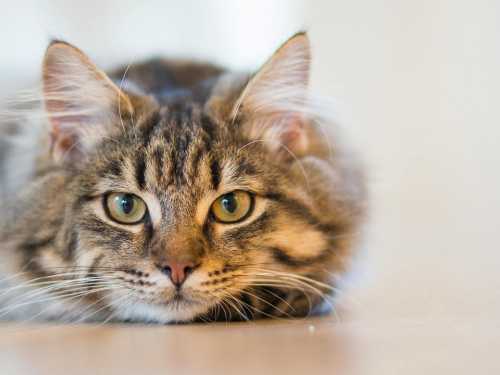
From a cat's perspective, scratching is perfectly normal. From a human's perspective, it's a habit that needs to be broken. Interestingly, cats don't just scratch for no reason, and it's not always an expression of aggression.
To answer the question of how to stop a cat from scratching, you need to find out why this happens?
When a cat is scared, claws are a form of defense. When it's time to file down the top layer of horny nails, your pet might get so caught up in the process that she doesn't even notice when she moves from the scratching post to your jeans. The fact that your legs are underneath the jeans isn't that important, at least not to her.
A domestic cat also scratches because it wants to leave its scent on everything, including its owner. Between the pads of its paws are glands that produce a secretion. This scent serves as a warning: the territory is occupied. Sometimes a cat will approach, place its paws on your lap, and begin to scratch. At first, it does this gently, but then, having “prepared the area,” it extends its claws. This is almost always unexpected, and sometimes quite painful.
Is it possible to change a cat's behavior? If the cat is an adult, it's unlikely to be able to stop it from clawing. It simply won't understand why it was okay to do so before and not now.
Little kittens scratch while playing, and if they stay with their mother for a long time, she will teach them to behave like gentlemen. However, in most cases, we bring home a very young kitten. We rejoice in its activity and allow it to do everything, including scratching. The kitten grows up, but the habits remain.
Observe the behavior of kittens at play, and you'll understand how to stop a cat from scratching. While playing with each other, kittens also occasionally extend their claws. When this happens, the one in pain yelps, and the “culprit” immediately retracts their claws.
A sharp sound is a signal that the kitten is engrossed in play. So, if they scratch you while playing, yelp, and the kitten will retract its claws. After that, get up and go about your business. Repeat this every time the kitten scratches while playing.
If your cat scratches when you pet her, you might be overdoing it. Petting her belly can be uncomfortable for a cat. At first, she'll twitch her tail slightly, letting you know she's uncomfortable. If you ignore her cues, even a well-behaved cat might lash out and scratch you.
It's like tickling. You're making reflexive movements, and the person tickling might accidentally get their hand… or foot, depending on how lucky they are. Don't punish a cat for scratching you if you were being overly persistent. Just freeze, remove your hand, and let the cat go.
The question of how to stop a cat from scratching often becomes a top priority. If a cat scratches a child, no parent will remain indifferent. No matter how much you love your pet, your child is more important.
If all else fails, there's no harm in resorting to the “heavy artillery.” An aggressive cat will quickly calm down if you cool it down with a little water from a spray bottle. This won't harm the pet, and your child won't have to walk around with bloody scratches, risking infection.
Since some feline diseases, such as toxoplasmosis, are fatal to humans, every precaution should be taken to prevent any risk of infection. Although toxoplasmosis is rarely transmitted through broken skin, risking your health or that of your child is unavoidable.
Along with regular preventative care like veterinary checkups and vaccinations, breaking your cat's scratching habit is an important part of your life with a cat.





